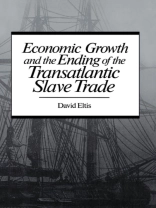This watershed study is the first to consider in concrete terms the consequences of Britain’s abolition of the Atlantic slave trade. Why did Britain pull out of the slave trade just when it was becoming important for the world economy and the demand for labor around the world was high? Caught between the incentives offered by the world economy for continuing trade at full tilt and the ideological and political pressures from its domestic abolitionist movement, Britain chose to withdraw, believing, in part, that freed slaves would work for low pay which in turn would lead to greater and cheaper products. In a provocative new thesis, historian David Eltis here contends that this move did not bolster the British economy; rather, it vastly hindered economic expansion as the empire’s control of the slave trade and its great reliance on slave labor had played a major role in its rise to world economic dominance. Thus, for sixty years after Britain pulled out, the slave economies of Africa and the Americas flourished and these powers became the dominant exporters in many markets formerly controlled by Britain. Addressing still-volatile issues arising from the clash between economic and ideological goals, this global study illustrates how British abolitionism changed the tide of economic and human history on three continents.
David Eltis
Economic Growth and the Ending of the Transatlantic Slave Trade [PDF ebook]
Economic Growth and the Ending of the Transatlantic Slave Trade [PDF ebook]
Mua cuốn sách điện tử này và nhận thêm 1 cuốn MIỄN PHÍ!
Ngôn ngữ Anh ● định dạng PDF ● ISBN 9780195364811 ● Nhà xuất bản Oxford University Press ● Được phát hành 1987 ● Có thể tải xuống 6 lần ● Tiền tệ EUR ● TÔI 2278524 ● Sao chép bảo vệ Adobe DRM
Yêu cầu trình đọc ebook có khả năng DRM












